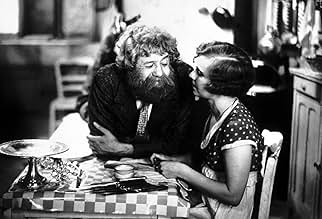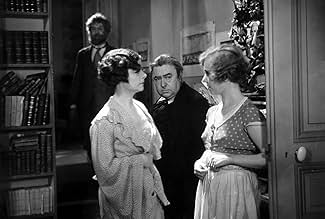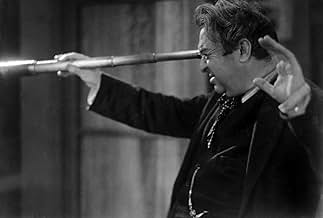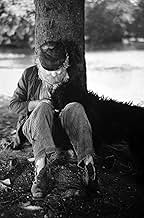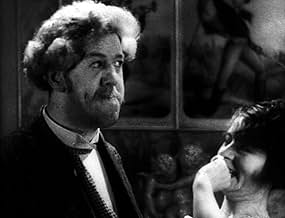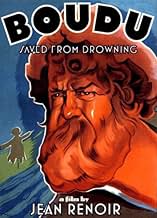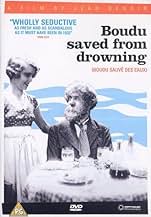No Quartier Latin em Paris, um livreiro salva o mendigo Boudu de se afogar no rio Siena em uma tentativa de suicídio e o acolhe em sua casa, mas o comportamento não convencional de Boudu des... Ler tudoNo Quartier Latin em Paris, um livreiro salva o mendigo Boudu de se afogar no rio Siena em uma tentativa de suicídio e o acolhe em sua casa, mas o comportamento não convencional de Boudu desafia os costumes burgueses.No Quartier Latin em Paris, um livreiro salva o mendigo Boudu de se afogar no rio Siena em uma tentativa de suicídio e o acolhe em sua casa, mas o comportamento não convencional de Boudu desafia os costumes burgueses.
- Édouard Lestingois
- (as Charles Granval de la Comédie Française)
- Le poète
- (não creditado)
- Un invité à la noce
- (não creditado)
- La promeneuse
- (não creditado)
- Rose, la voisine
- (não creditado)
Avaliações em destaque
I am sort of conflicted on this film in regards my take on it. On one hand it is generally regarded as a classic while also being "of its time" in some aspects so the pressure is on me to join the "intelligent" voice of praise and also put down anything I didn't "get" to being of time and period. But then on the flip of that, the film as a story or commentary just didn't really work for me. I understand the challenge to the idea of Chaplin's genial little tramp but the message from the film is not delivered as well as it could have been and as such it didn't work that well. If the film is meant to be a dig at the pompous middle-class then it missteps by focusing so much Boudu's wild behaviour instead of making more of his inability to accept the trimmings of this ridiculous middle-class world. By not bringing out this middle-class world, Renoir prevents the viewer from doing that.
So the message then seems to suggest that some people prefer to life this wilder life and to try and change them is pointless. By my standards this is a point that I would need more convincing on and it isn't helped by being done in a comedic and farcical way such as it is. Perhaps though I am reading too much into it and it is just meant to be a broad class-clash farce? If it is then it is certainly broad because the lack of strongly formed commentary on either the poor or the middle-classes means that we get lots of aping rather than barbed physical comedy. It certainly has a light air of comedy to it that is amusing but it is rarely really funny or enjoyable.
Where the film is impressive though is in the direction. Renoir takes affectionate and "strolling" approach to his shots of Paris. Not going for full-on tourist stuff so much as he just lets Paris "be" around his film. Better still is his work in and around the house, specifically some of his shots where he films from one side of the house, through rooms and windows into the where the action is really interesting and effective shots that prevent it feeling like a sound-stage and create the idea that this is all real. The cast are solid enough for the material. Everyone loves Simon so I guess again I am alone on that. For my tastes he is just too broad and obvious in his Boudu he feels like he is acting in a silent movie because all his actions are big and telegraphed and he is too excessive in all aspects to win me over with rough charm. Gravval, Hainia and others are actually better as they have more grounded characters to deliver and thus have more of interest for me.
I'm open to being criticised on this because I appreciate that most people are falling over themselves to praise this and even those with issues with it seem to follow up with "but" in their reviews. However for me the story and content just didn't work and what it left was a sort of broad farce that didn't have any commentary teeth and wasn't funny or charming enough to get away without them. Technically it was engaging and impressive in the direction of the camera but otherwise I was really very disappointed with it for what it didn't manage to do.
Needless to say,"Boudu" would not be "Boudu" without Michel Simon's extraordinary presence.Such an actor does not exist anymore in French contemporary cinema.And his filmography is full of treasures.To think that he also worked with Duvivier,Carné,Clair,Decoin and so many more..
Remakes "down and out in Beverly Hills" with Nick Nolte and Bette Middler. "Boudu" ,by Gérard Jugnot,this very year. Are they necessary?
Well, once again Simon's performance makes this film worth watching. While in this case his acting is NOT subtle or perhaps as high quality as he's done in other films (it's a bit over-the-top), it's fun to just turn off your mind and watch the silliness. This film will not change your life and is a pretty insignificant film but still good to watch nonetheless. I think, for me, the reason I didn't enjoy the film more is that the character of Boudu is a pretty awful person and I just couldn't buy that he was such a sexual dynamo that he was able to make these women forget how crude, selfish and disgusting he was just by turning on the old libido!
So my verdict is that this is a good film that you can watch only if you suspend disbelief. Oh, and I forgot to mention, director Renoir did a great job on the film. For a 1931 French film, the sound and camera work are superb--something you DON'T see in many other films from this country until the later 1930s--he was truly ahead of his time.
"Boudu Sauvé Des Eaux", which literally means "Boudu Saved from the Water" is better known in English as ""Boudu saved from Drowning", as it is the tale of a tramp named Boudu (Michel Simon), who disenchanted with life after he loses his dog, decides to jump into the river Seine hoping to die. But Boudu's plan fails as he is saved by a gentle bookseller named Edouard Lestingois (Charles Granval), who after reviving him decides to "adopt" the tramp in his family, with the hope of making a good gentleman out of the bum. However, Boudu proves to be a difficult case, as with his lack of manners and wild anarchism shakes the lives of those living at Lestingois house, causing a mess everywhere becoming the terror of Lestingoi's wife Emma (Marcelle Hainia) and a source of constant frustration for Edouard Lestingois himself.
Based on a play by René Fauchois, "Boudu Sauvé Des Eaux" was adapted to the screen by Renoir himself and the then-newcomer Albert Valentin, whom certainly took advantage of the different possibilities that cinema offered to expand on the anarchic humor of the play. As one can imagine, the source of most of the movie's comedy lays in the social differences between Boudu and the Lestingoi family, making fun the bourgeois values of French society without mercy and surprisingly, void of any moralist stance. It is a very modern movie in this aspect, as without any pretensions or false sentimentalism (he makes sure of not making Boudu a hero) Renoir makes a poignant social commentary that is as clever as it's funny. The excellent development of his assortment of characters is the icing of the cake in what truly is one of Renoir's best screenplays among his early works.
As written above, in his adaptation of "Boudu Sauvé Des Eaux" director Jean Renoir looked for a more cinematic approach to the play, avoiding the use of sets almost completely and shooting on location as much as possible. This use of natural landscapes and real locations, together with Renoir's smooth and skillful camera-work create a sense of realism that later would become Renoir's trademark. Giving excellent use to Georges Asselin' cinematography, Renoir uses everyplace he can as a stage for his film, literally taking us along with Boudu in his adventure inside the Lestingois house. This wasn't the first time Renoir worked this way, but "Boudu Sauvé Des Eaux" was a further development of this style, a technique that would find its higher point in the three masterpieces he made later on that decade. While not one of his classics, many of Renoir's trademarks can already be seen here.
One of the elements that make "Boudu Sauvé Des Eaux" so enjoyable is definitely the acting, as everyone in the cast is simply excellent. The highlight is of course the legendary Michel Simon, who as Boudu, delivers one of the best and funniest performances in his career. With delightful malice and a good dose of cynicism, Simon makes Boudu a complex character that can go from being the most sympathetic antihero to the most despicable human being in seconds, and always without losing that charm that helps him to carry the film. As the Lestingois couple, Charles Granval and Marcelle Hainia are certainly playing caricatures, however, with extraordinary talent these two actors make the most of their characters, making them more complex and very vivid. Finally, Sévérine Lerczinska makes a terrific scene stealing performance that makes one wonder why did her career on film was so short.
While a harsh critique on the self-righteousness of the French bourgeoisie and the differences between classes (often compared to Chaplin's work), Renoir never intends this to be a moral lesson, as unlike what happens in Chaplin's films, neither Boudu is completely good nor Lestingois is completely bad. Instead of the classic "rich = bad, poor = noble" archetypes, "Boudu Sauvé Des Eaux" shows a very natural balance between both social classes, making fun of the clash of both without sentimentalism and with subtle malice, as if Renoir was stating that neither are exactly good. Even when "Boudu Sauvé Des Eaux" and its style of anarchic humor may look dated now, the movie is still very fun to watch. It isn't a masterpiece of cinema, but still holds up today, more than 70 years after its release.
Lighthearted but clever, "Boudu Sauvé Des Eaux" makes a nice introduction to the work of Jean Renoir as it has many of the elements that would become the basis of his work but under a simpler, friendlier facade. "Boudu Sauvé Des Eaux" may look a bit slow and dated nowadays, but it's still as valid as ever and an excellent example of French comedy of the 30s. A very recommended film. 8/10
** 1/2 (out of 4)
A wealthy man saves a homeless guy from drowning and then takes him into his home where the bum soon starts to seduce his wife and mistress. As Jim stated earlier I too prefer the remake Down and Out in Beverly Hills. I think the biggest problem with this film is that the homeless guy is such a jerk it's hard to really care about him and he does the dumbest things that just seem so over the top that I couldn't laugh at him either. Halfway through the movie I was wishing the rich guy had let him drown so that the movie would have already been over.
Você sabia?
- CuriosidadesFrench audiences were outraged by Boudu's antisocial behavior to the extent that police had to be called to several theaters to restore order. In some areas the film was immediately pulled because of its polarizing effect.
- Citações
Chloë Anne Marie, la bonne: Why have a piano if no one plays it?
Édouard Lestingois: Even so, we have a piano because we are respectable people.
- Versões alternativasThere is an Italian DVD edition of this movie, distributed by DNA Srl. The movie was re-edited with the contribution of the film history scholar Riccardo Cusin. This version is also available in streaming on some platforms. This DVD also contains another movie by Jean Renoir: Toni (1935).
- ConexõesEdited into Histoire(s) du cinéma: Seul le cinéma (1994)
- Trilhas sonorasGénérique
Performed by Raphaël
Principais escolhas
- How long is Boudu Saved from Drowning?Fornecido pela Alexa
Detalhes
- Data de lançamento
- País de origem
- Idioma
- Também conhecido como
- Boudu Saved from Drowning
- Locações de filme
- Berges de la Seine, Paris, França(Exterior)
- Empresas de produção
- Consulte mais créditos da empresa na IMDbPro
Bilheteria
- Faturamento bruto mundial
- US$ 2.805
- Tempo de duração1 hora 25 minutos
- Cor
- Proporção
- 1.19 : 1
Contribua para esta página


